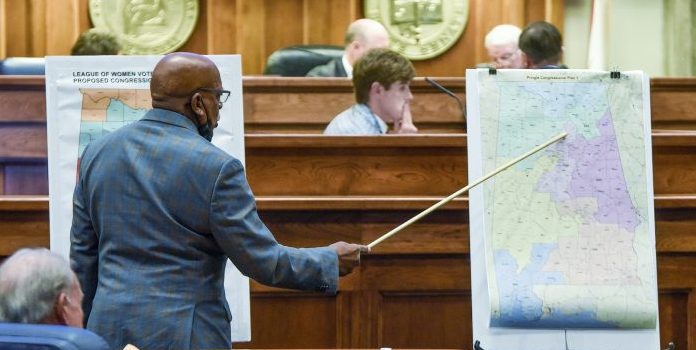(Headline USA) The US Supreme Court put on hold a lower court ruling that Alabama must draw new congressional districts before the 2022 elections to increase black voting power.
The high court order boosts Republican chances to hold six of the state’s seven seats in the House of Representatives as nationwide redistricting battles waged by left-wing activists have used so-called sue-till-blue lawsuits to undermine red-state population gains in an effort to help Democrats maintain political power.
The court previously determined that race-based gerrymandering violated federal law in a case that helped the Left force the redrawing of North Carolina’s maps prior to the 2018 midterm elections.
This time, however, activists hoped to force the state legislature to consider race as a factor by making it add a new district in what is known colloquially as the “Black Belt,” a soil-rich area where cotton plantations once thrived in the days of slavery.
A three-judge federal panel last week sided with the activists, including the American Civil Liberties Union of Alabama, who had waged the lawsuit, saying the plaintiffs were likely to prevail in asserting a violation of the Voting Rights Act.
The panel, which included two judges appointed by former President Donald Trump, wrote that “we do not regard the question … as a close one.”
The Supreme Court’s action, by a 5-4 vote announced Monday, means the upcoming elections will be conducted under a map drawn by Alabama’s Republican-controlled legislature that contains one majority-black district. Democrat Rep. Terri Sewell is the current congresswoman representing the state’s 7th congressional district.
Because roughly a quarter of Alabama’s population is black, the plaintiffs argued that they were underrepresented by the current configuration. However, having two of the seven districts presumably alotted to Democrats may result in overrepresentation.
Justices Brett Kavanaugh and Samuel Alito said the lower court’s order for a new map came too close to the 2022 election cycle.
Chief Justice John Roberts joined his three more liberal colleagues in dissent.
The justices will at some later date decide whether the map produced by the state violates the landmark voting rights law, a case that could call into question “decades of this Court’s precedent about Section 2 of the VRA,” Justice Elena Kagan wrote in dissent.
That decision presumably will govern elections in 2024 through the end of the decade in Alabama and could affect minority political representation elsewhere in the country, too.
Alabama asked the Supreme Court to put the ruling on hold while it appeals, and the justices agreed. The state argued that it drew the new map guided by race-neutral principles and that the new map is similar to past maps.
More than a dozen mostly Republican-led states had filed a brief urging the justices to side with Alabama and allow it to use the maps it originally drew.
But Deuel Ross, a lawyer with the NAACP Legal Defense and Educational Fund, wrote in an email to the Associated Press that the legal battle was only beginning.
“The litigation will continue, and we are confident that Black Alabamians will eventually have the congressional map they deserve—one that fairly represents all voters,” he claimed.
Alabama Attorney General Steve Marshall called the order a victory for the state and said he believes the state will “ultimately prevail” in the ongoing litigation.
Marshall’s office argued the state’s congressional districts are similar to those in use, and approved by the courts, since the 1990s.
Roberts, who typically votes against consideration of race, wrote that he shares some of Alabama’s concerns, but still would have let the redrawn districts govern the 2022 election and have future elections governed by the ultimate outcome in the case.
Kavanaugh, writing to explain his vote, stressed that the court has repeatedly declined in the past to change the rules close to an election.
“When an election is close at hand, the rules of the road must be clear and settled. Late judicial tinkering with election laws can lead to disruption and to unanticipated and unfair consequences for candidates, political parties, and voters, among others. It is one thing for a State on its own to toy with its election laws close to a State’s elections. But it is quite another thing for a federal court to swoop in and re-do a State’s election laws in the period close to an election,” he wrote in an opinion Alito joined.
Taking issue with Kavanaugh, Kagan noted that the lower court ruled months before any votes will be cast.
She criticized the majority for using the emergency application process known as the shadow docket “to signal or make changes in the law, without anything approaching full briefing and argument.”
Adapted from reporting by the Associated Press

